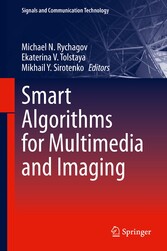Suche
Lesesoftware
Specials
Info / Kontakt

Smart Algorithms for Multimedia and Imaging
von: Michael N. Rychagov, Ekaterina V. Tolstaya, Mikhail Y. Sirotenko
Springer-Verlag, 2021
ISBN: 9783030667412 , 433 Seiten
Format: PDF
Kopierschutz: Wasserzeichen



Preis: 128,39 EUR
eBook anfordern 






